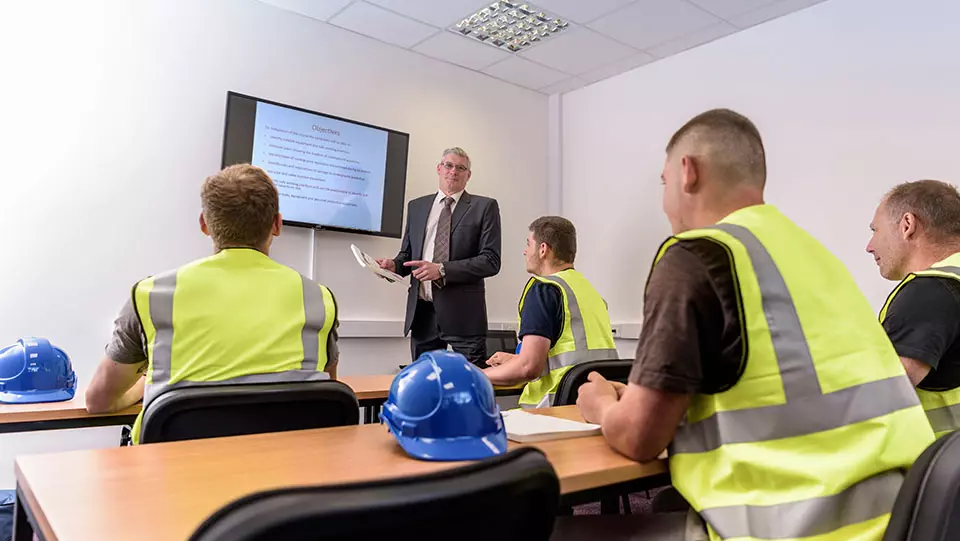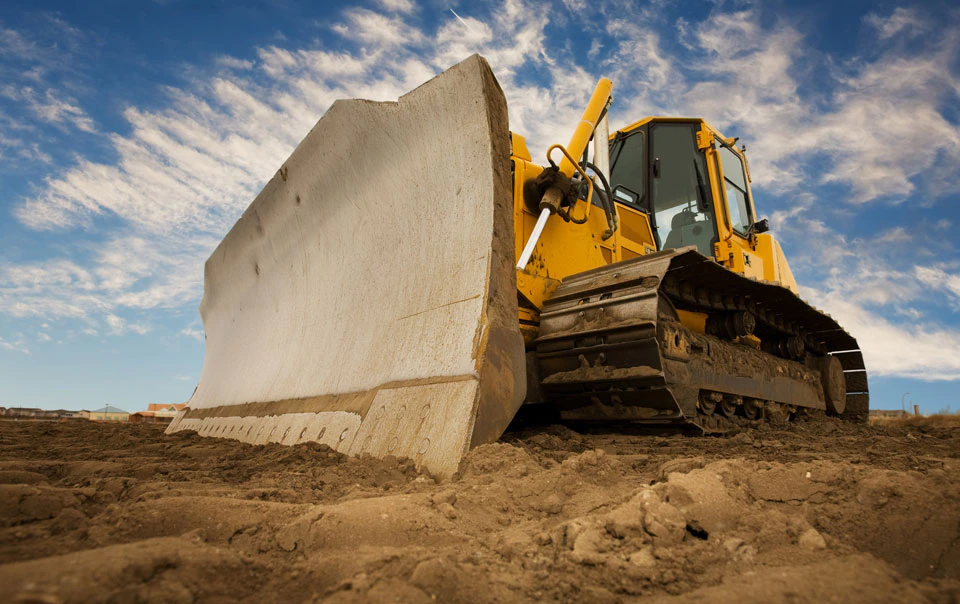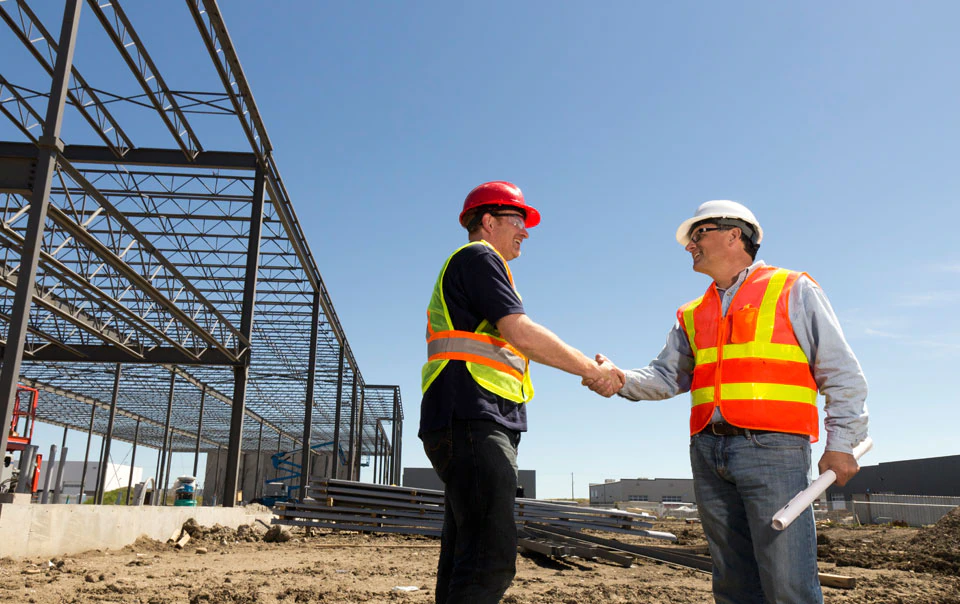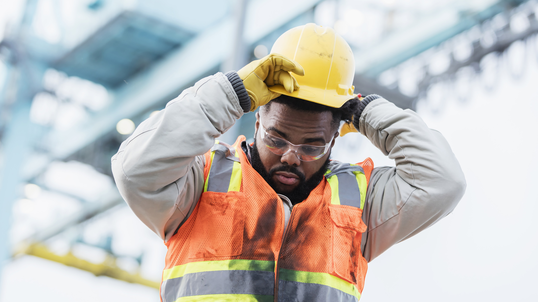Contractors' Equipment: Rent, Buy, Borrow or Refurbish?

(DESCRIPTION)
Travelers Logo
TEXT: Contractors Equipment: Risks and Benefits of Renting, Buying and Refurbishing.
Graphics show a man in a hard helmet stands against a brick wall.
(MUSIC PLAYING)
(SPEECH)
How do contractors like you choose between renting, leasing, buying, or refurbishing your equipment?
(DESCRIPTION)
Graphics show a crane, bulldozer and scissor lift appear for Rent or Lease, Buy and Refurbish.
(SPEECH)
And what are the coverage concerns with each of these choices?
(DESCRIPTION)
Graphic shows question marks appear for Rent or Lease, Buy, and Refurbish, then the equipment graphics appear again. Yellow triangle exclamation mark signs appear next to the crane, bulldozer, and scissor lift.
(SPEECH)
Insufficient coverage after an accident or theft can have a long lasting impact on the health of your business.
(DESCRIPTION)
Graphic shows the bricks below the equipment graphics start to shake and fall, and the equipment falls with them and appears inside red boxes.
(SPEECH)
How you choose to acquire and ensure your equipment can lead to some coverage gaps.
(DESCRIPTION)
Graphic shows a magnifying glass hovers over the equipment graphics and a coverage policy appears inside the round glass.
(SPEECH)
If a piece of equipment is stolen or damaged, it can lead to some hefty costs that you may have to cover.
(DESCRIPTION)
Graphic shows the bulldozer disappears, then the box with the crane flips around to show dollar bill icons and dollar signs. The two other boxes do the same, then scroll up off screen.
(DESCRIPTION)
TEXT: Here's how each choice can have an impact.
(SPEECH)
While renting or leasing may seem like a good option, not all policies have you covered, especially in the case of theft or damage.
(DESCRIPTION)
Graphic shows a crane labeled Rent or Lease drives along, then tips forward and crashes to the ground. Insurance policy paperwork appears with red check marks next to text blocks and the words Theft or Damage at the bottom.
(SPEECH)
Buying the equipment outright may save you money in the long run if you're going to use it more frequently.
(DESCRIPTION)
Graphic shows the word Buy appears in the middle of the screen and a bulldozer drives along scooping up piles of snow, dirt, and bricks. Insurance policy paperwork appears with red check marks next to text blocks and a red question mark at the bottom.
(SPEECH)
But it's important to make sure every piece of equipment is correctly classified under your policy, otherwise you may find your new purchase isn't fully protected.
(DESCRIPTION)
Graphic shows a line extends from the question mark to the bulldozer, then pulls back, and the paperwork moves upwards off the top of the screen. The scene is at night with a moon in the dark sky. The dark shadow of a man stands behind the bulldozer.
(SPEECH)
Refurbishing can be a great alternative to buying,
(DESCRIPTION)
Graphic shows the scissor lift appears and then paperwork with the words Valuation of Refurbished Equipment at the top with text blocks in the middle and the words Utility and Age at the bottom.
(SPEECH)
but not all policies account for the correct valuation of refurbished equipment.
(DESCRIPTION)
Graphic shows four dollar signs appear next to the word Utility and one dollar sign appears next to the word Age. A red line is drawn through the word Utility.
(SPEECH)
With so many factors to consider, it can feel overwhelming.
(DESCRIPTION)
Graphic shows paperwork pages appear all over the screen and cover the equipment and Valuation graphics.
(SPEECH)
But Travelers helps contractors like you with our specialized coverages and services and a commitment to your business needs.
(DESCRIPTION)
Graphic shows the equipment graphics appear again in red boxes with a red arrow pointing to the bulldozer. The red arrow moves to the crane, then to the scissor lift, then back to the bulldozer. The red boxes scroll up off screen, and the crane appears. A yellow circle labeled with a yellow triangle exclamation mark sign appears on part of the crane. A text box with the speaker's words appears next to the crane.
(SPEECH)
We have dedicated risk control specialists that can provide you with equipment maintenance insights and recommendations to help manage your risks no matter how you choose to acquire your equipment.
(DESCRIPTION)
Graphic shows a red circle with a check mark replaces the yellow circle on the crane. The crane and text box scroll up off screen, and a dotted outline of the bulldozer appears with question marks inside of it. A text box with the speaker's words appears next to the outline.
(SPEECH)
We also have a Traveler Special investigations Group that can help recover stolen items and share theft prevention strategies with you.
(DESCRIPTION)
Graphic shows the bulldozer pops into the outline, a circle with a lock appears inside of it, then the bulldozer scrolls up off screen along with the text box. The scissor lift appears with smoke billowing out of it. A text box with the speaker's words appears next to the scissor lift.
(SPEECH)
And our contractors equipment product and optional endorsements can help provide coverage when the unexpected happens.
(DESCRIPTION)
Graphic shows a red circle with a check mark appears on the scissor lift and the smoke dissipates, then the scissor lift and text box scroll up off screen. Graphic shows Human figure icons appear in circles along with the speaker's words.
(SPEECH)
Our dedicated underwriters, risk control consultants, and claim professionals are all here to help with services, coverages, and expertise that can make all the difference.
(DESCRIPTION)
Graphic shows the human figure icons disappear from the circles, then the circles converge and form the Traveler's logo umbrella icon.
(SPEECH)
To learn more, speak with your independent agents or visit us at www.travelers.com/contractorsequipment.
(DESCRIPTION)
Travelers logo
TEXT: To learn more speak with your independent agent or visit us at www.travelers.com/ContractorsEquipment
© 2023, The Travelers Indemnity Company. All rights reserved. Travelers and the Travelers Umbrella logo are registered trademarks of The Travelers Indemnity Company in the U.S. and other countries. This material does not amend, or otherwise affect, the provisions or coverages of any insurance policy or bond issued by Travelers. It is not a representation that coverage does or does not exist for any particular claim or loss under any such policy or bond. Coverage depends on the facts and circumstances involved in the claim or loss, all applicable policy or bond provisions, and any applicable law. Availability of coverage referenced in this document can depend on underwriting qualifications and state regulations.
For contractors, equipment can be the lifeblood of a business, and keeping your construction equipment running well can be critical to a project's success. When you need equipment, you review your anticipated work volumes and your fleet management to determine equipment needs. Then it comes down to this: Should I rent, lease, buy, borrow or refurbish? The choice can have a long-lasting impact on your business, especially for more expensive pieces of equipment.
Here’s a look at the benefits and risks to these options for filling your equipment needs and some tips to help make sure you’re properly covered.
Equipment rental or leasing
- If you rent or lease equipment, you pay for the equipment rental only when you need it. Leasing can have tax advantages for you, and can be appealing for those who are hesitant to take on extra debt.
- Renting is usually a monthly arrangement, while leasing is better for longer jobs. You should consider renting or leasing equipment that you will use occasionally.
- Some pieces of equipment require more frequent repair – sometimes major repair – due to day-to-day use. By renting/leasing, you leave these costs with the rental/leasing agent, as they are typically borne by the rental/leasing agent.
- If renting or leasing equipment doesn’t seem like a good fit for your business model, consider borrowing equipment from another contractor on the job site or one who isn’t using the equipment at that time.
Insurance considerations
Contractors' equipment insurance policies can have different rules for rented, borrowed and leased equipment as compared to the rules that may apply to equipment that is purchased. For example, the policy might not provide coverage for or may limit the value of rented, borrowed or leased equipment or it might exclude certain activities, such as waterborne construction.
Likewise, if the rental agent provides equipment rental insurance, you must pay attention to what's covered and what's not. This insurance might only cover damage from certain hazards, like fire. It may also exclude coverage if you lend the non-owned piece of equipment to someone else. Review the terms and conditions carefully to ensure you don’t find yourself without coverage.
Lastly, if you borrow equipment from another contractor, review your coverage carefully with your agent. You’ll want to be certain there aren’t any gaps in coverage for this scenario.
Buying construction equipment
- The more you use a piece of equipment, the more it makes sense to buy it. If the equipment will be used for many years, buying it can create long-term value and end up costing less overall than renting or leasing.
- Another advantage of owning construction equipment is that your employees will become accustomed to using it. Every time an employee uses a new piece of equipment, there is a learning period. If you buy a piece of equipment and have your employees consistently use it, you can build their expertise, potentially avoiding accidents.
- Finally, the long-term costs of buying are more predictable. You will know what your monthly payment is for the piece of equipment and become familiar with its operating costs.
Insurance considerations
If you decide to buy construction equipment, you should make sure it's covered under the right insurance. For example, if you buy a new concrete pump truck, is there coverage under your contractor insurance policy or the vehicle policy?
Some activities could also be excluded, like overloading a crane. You should review with your insurance agent how you plan on using the equipment to see if it's all covered.
Contractors' equipment policies typically have a reporting requirement for newly acquired equipment. This policy condition requires you to notify your insurer whenever you buy equipment that exceeds the policy limits. Ask your insurance agent whether your policy has such a condition so that you can ensure you are notifying your carrier within the specified time frame.
Finally, you should insure the new piece of equipment to its correct value. This is simple for brand-new equipment, as it's the purchase price. But correctly valuating used equipment can be more difficult. You should work with your agent to determine the correct valuation.
Using refurbished equipment
- Refurbishing an older, unique or specialized piece of equipment that can’t easily be replaced is another option to consider. Additionally, if you are comfortable using a certain piece of equipment, you may prefer to continue using it. Refurbishing gives you this option.
- When considering whether to refurbish, you should consider the risks of maintaining an older piece of equipment. No matter how carefully you maintain everything, you still face the increased chance of equipment breaking down, and causing you to miss a project deadline. Also, replacement parts for older pieces of equipment may no longer be available or may be difficult to obtain.
Insurance considerations
With refurbished equipment, the main insurance concern is determining the correct valuation. If the insurance company values the equipment based solely on its age, it could underestimate its worth. To avoid undervaluation, request that your policy list an agreed value for refurbished equipment.
Review your coverage and plan for your equipment with your insurance agent to ensure your new investment and business will be protected.



